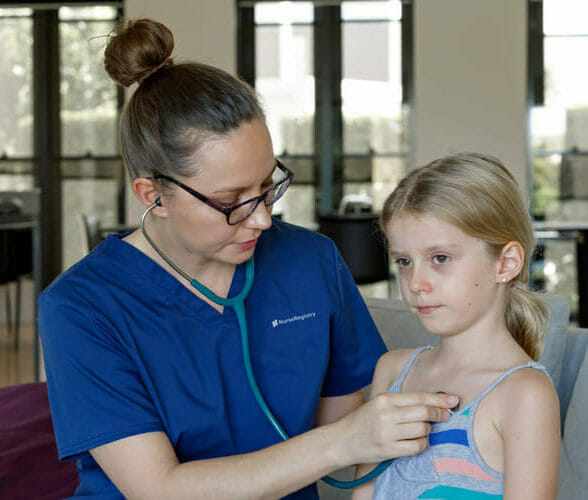What Does a Pediatric Nurse Do?
IN THIS ARTICLE
It’s a common misconception. As health care professionals, we know that a private duty nurse is not there to take the parents’ place. Instead, the nurse is there to provide clinical and support services for the child and their parents.
Parents are still the ones who raise their children, talk to doctors, and ultimately, make the decisions. With that said, it can be helpful to have a nurse come along to help, assess, and allow time for parents to take a break.
For parents with medically fragile children, burnout is all too real. While it is an admirable decision to be a full-time parent and caregiver, it can be doubly as stressful. Ultimately, caregiver stress can jeopardize care of the child—which is the exact opposite of a parents intention.
In 2009, it was reported that 16.8 million family caregivers were caring for special needs children under the age of 18. More than half of those caregivers were caring for their own children. (This data was provided by the National Alliance for Caregiving in collaboration with AARP.)
Let’s dive more into what a pediatric nurse is and their responsibilities.
Key Takeaways
- Pediatric nursing is a specialized field of nursing that focuses on providing healthcare to children, from infants to adolescents.
- Pediatric nurses must possess excellent communication skills, patience, compassion, and empathy.
- Pediatric nurses work in various settings, including hospitals, clinics, private practices, and schools, to provide care for children with a wide range of medical conditions.
Pediatric Nurse Job Responsibilities

Pediatric nurses specialize in providing medical care to children, from newborns to adolescents.
They work closely with physicians and other healthcare professionals to ensure that children receive the best possible care. Pediatric nurses use their empathy, patience, and communication skills to explain treatment plans and diagnoses to both patients and their parents.
Direct Patient Care
Pediatric nurses are responsible for providing direct patient care to children.
They monitor their vital signs, administer medication, and perform medical procedures as needed. They also work with physicians to develop treatment plans and monitor patient progress. Pediatric nurses must be skilled at working with children and making them feel comfortable and safe.
Patient Education
Pediatric nurses play an important role in educating patients and their families about their health.
They explain medical procedures and treatments in a way that children and parents can understand. They also provide information about preventive care and healthy lifestyle choices.
Support for Families
Pediatric nurses provide support to families during difficult times. They work closely with parents and caregivers to ensure that they understand their child’s condition and treatment plan. They also provide emotional support to families and help them cope with the stress of having a sick child.
In summary, pediatric nurses provide essential medical care to children and play a critical role in educating patients and families about their health. They are compassionate, knowledgeable, and skilled healthcare professionals who work tirelessly to ensure that children receive the best possible care.
Pediatric Nurse Educational Pathways

Nursing Degrees
To become a pediatric nurse, one must first obtain a nursing degree. There are two main types of nursing degrees: an Associate Degree in Nursing (ADN) and a Bachelor of Science in Nursing (BSN). An ADN program typically takes about two years to complete, while a BSN program takes about four years. A BSN degree is preferred by many employers and may lead to more career opportunities.
Licensure and Certifications
After obtaining a nursing degree, the next step is to become licensed. All states require registered nurses (RNs) to be licensed. To become licensed, one must pass the National Council Licensure Examination (NCLEX-RN). In addition to licensure, pediatric nurses may choose to obtain certifications in pediatric nursing. The Pediatric Nursing Certification Board (PNCB) offers certification for pediatric nurses.
Specialized Training
Pediatric nurses must have specialized training in pediatrics. This includes knowledge of child development, growth and development milestones, and common childhood illnesses and conditions. Many hospitals offer pediatric nurse residency programs to provide additional training and support for new pediatric nurses. Continuing education is also important to stay up-to-date on the latest advancements in pediatric nursing.
In summary, to become a pediatric nurse, one must obtain a nursing degree, become licensed, and have specialized training in pediatrics. Obtaining certifications and continuing education can also enhance career opportunities and provide additional knowledge and skills.
Key Skills and Qualities for Pediatric Nurses
Pediatric nurses play a crucial role in providing healthcare services to children, from newborns to teenagers. They must possess a unique set of skills and qualities to ensure that they provide the best possible care for their young patients. Some of the most important skills and qualities that a pediatric nurse should have are:
Communication Skills
Pediatric nurses must be excellent communicators to ensure that they can convey important information to their young patients and their families effectively. They must be able to explain medical procedures, diagnoses, and treatment plans in a way that children can understand. Additionally, they must be able to communicate effectively with other healthcare professionals to ensure that their patients receive the best possible care.
Empathy and Compassion
Pediatric nurses must be empathetic and compassionate to provide emotional support to their young patients and their families. They must be able to understand the fears and concerns of children and their families and provide them with the necessary emotional support to help them cope with their illness or injury.
Attention to Detail
Pediatric nurses must be detail-oriented to ensure that they provide accurate and precise care to their young patients. They must be able to pay close attention to details such as medication dosages, vital signs, and medical charts to ensure that their patients receive the right care at the right time.
Stress Management
Pediatric nurses must have excellent stress management skills to cope with the emotional and physical demands of their job. They must be able to handle stressful situations with calmness and professionalism, and they must be able to provide emotional support to their young patients and their families during difficult times.
In summary, pediatric nurses must possess a unique set of skills and qualities to provide the best possible care to their young patients. They must be excellent communicators, empathetic and compassionate, detail-oriented, and have excellent stress management skills. These skills and qualities are essential for pediatric nurses to succeed in their profession and provide the best possible care to their young patients.
Workplace Settings
Pediatric nurses work in a variety of settings, including hospitals, clinics, and schools. Each setting offers unique opportunities and challenges for nurses to provide care to children.
Hospitals
Pediatric nurses in hospitals work in a variety of departments, including the emergency room, intensive care unit, and general pediatrics. In these settings, nurses must be prepared to care for children with a wide range of medical conditions, from minor illnesses to life-threatening injuries. They may also work closely with other healthcare professionals, including doctors, respiratory therapists, and social workers, to provide comprehensive care to their patients.
Clinics
Pediatric nurses in clinics work in outpatient settings, providing care to children with a variety of medical needs. They may work in private practices, community health clinics, or specialty clinics, such as those that focus on asthma or diabetes management. In these settings, nurses may perform routine check-ups, administer vaccines, and provide education to parents and children about healthy habits.
Schools
Pediatric nurses in schools work in elementary, middle, and high schools, providing care to students with a variety of medical needs. They may work with students who have chronic conditions, such as asthma or diabetes, or with students who require occasional medical attention, such as those who have suffered an injury on the playground. In these settings, nurses must be prepared to work independently and make quick decisions to provide care to their patients.
Overall, pediatric nurses work in a variety of settings to provide care to children with a wide range of medical needs. They must be prepared to work closely with other healthcare professionals and make quick decisions to provide the best possible care to their patients.
Challenges and Rewards

Emotional Challenges
Pediatric nursing can be an emotionally challenging career. Nurses in this field often work with children who are seriously ill or injured, which can be difficult to handle emotionally. It can be frustrating for a pediatric nurse to communicate with children, especially with very young children who can’t understand what is happening. Children can struggle to describe their symptoms or understand that an uncomfortable treatment is going to help them. This can be emotionally draining for nurses who care deeply about their patients.
Professional Satisfaction
Despite the emotional challenges, pediatric nursing can be incredibly rewarding. Nurses in this field have the opportunity to make a real difference in the lives of their patients and their families. They work closely with doctors, family members, and other healthcare providers as part of a child’s clinical care team. They often act as a liaison between children, caregivers, and physicians to facilitate communication. One of the most important soft skills a pediatric nurse possesses is the ability to help the families of young patients navigate fear and stress during vulnerable, confusing times. A typical workday for a pediatric nurse may be the worst day in a parent’s life, but by providing compassionate care and support, they can help families find hope and healing.
Pediatric nurses also have the opportunity to develop specialized skills and knowledge in areas such as neonatal care, pediatric oncology, and pediatric surgery. They may work in a variety of settings, including hospitals, clinics, and schools. The demand for pediatric nurses is high, and they can expect to earn a competitive salary and have a stable career with opportunities for advancement.
In conclusion, pediatric nursing can be emotionally challenging, but it is also an incredibly rewarding career. Nurses in this field have the opportunity to make a real difference in the lives of their patients and their families, and to develop specialized skills and knowledge in a variety of areas.
At NurseRegistry, our nurses are highly skilled and ready to provide 1-on-1 care for infants, children, and adolescents. The tasks they perform may vary from family to family, as each child is different. All nurses are licensed and experienced to provide the best care for their patients.
One of the most valuable forms of care provided by private duty nurses is respite care, which can be especially beneficial for parents of children with medically complex issues. Respite care is short-term, temporary care provided for the child so that their family can take a break from the daily routine of caregiving. It can be useful for parents who are full-time caregivers, allowing them the opportunity to take a short break and recharge.
Hire a Professional Pediatric Nurse Today
NurseRegistry offers licensed, experienced, and professional pediatric nurses for residents of California and Florida. Our team is dedicated and thorough when assisting you with a perfectly matched pediatric nurse who has the exact skill set required to probably care for your young loved one.
Children are our world and we would do anything to care for them. If you believe a private nurse is the best choice for your child, click here to get started today.
Frequently Asked Questions about Pediatric Nursing
What qualifications are needed to become a pediatric nurse?
To become a pediatric nurse, one must first obtain a nursing degree, typically either an Associate Degree in Nursing (ADN) or a Bachelor of Science in Nursing (BSN). After obtaining the degree, the individual must pass the National Council Licensure Examination (NCLEX) to become a registered nurse (RN). From there, the individual can specialize in pediatric nursing through further education and training.
What are the daily duties and responsibilities of a pediatric nurse?
Pediatric nurses care for children from infancy through adolescence, providing medical care and emotional support to both the patient and their family. Daily duties may include administering medication, monitoring vital signs, performing diagnostic tests, and providing education on treatment plans to parents and caregivers.
How does the salary of a pediatric nurse compare to other nursing specialties?
The salary of a pediatric nurse can vary depending on factors such as education level, experience, and location. However, on average, pediatric nurses earn a salary comparable to that of other nursing specialties.
What are the different specializations within pediatric nursing?
Pediatric nursing offers a variety of specializations, including neonatal nursing, pediatric oncology nursing, pediatric emergency nursing, and pediatric critical care nursing. Each specialization requires additional education and training beyond a standard nursing degree.
How long does it typically take to complete education and training for pediatric nursing?
The length of time it takes to complete education and training for pediatric nursing can vary depending on the individual’s chosen path. Generally, it takes two to four years to complete a nursing degree, and additional education and training may be required to specialize in pediatric nursing.
What are the work environments available for pediatric nurses?
Pediatric nurses can work in a variety of settings, including hospitals, clinics, private practices, and schools. They may also work in home health care, providing care for children who require ongoing medical attention.
What is the Difference Between a Pediatric Nurse and an RN?
A pediatric nurse is a registered nurse who specializes in caring for children, while an RN is a registered nurse who may work with patients of all ages. Pediatric nurses receive additional education and training to specialize in pediatric care, and may work in a variety of settings specific to pediatric care.





